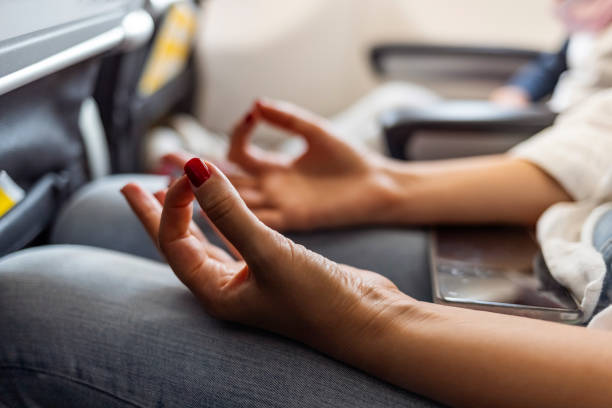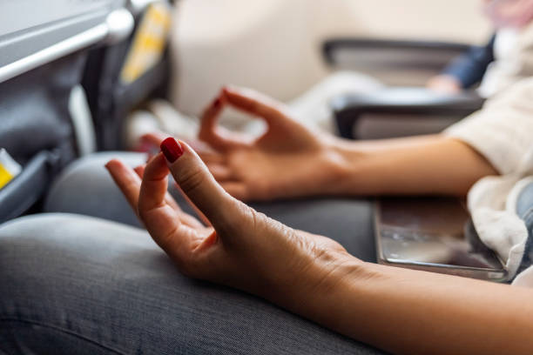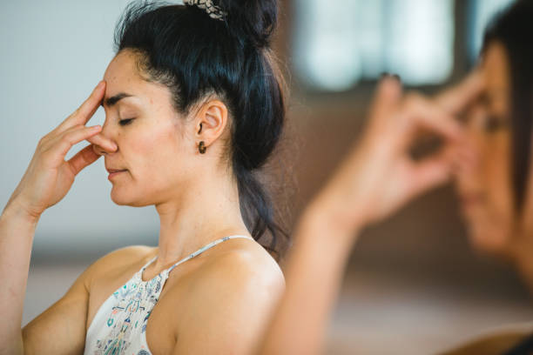Flight anxiety is something many travelers face, and it’s completely understandable! Whether it’s a fear of heights, feeling cramped in a small space, or worrying about turbulence, this anxiety can really put a damper on what should be an enjoyable journey. The good news is that there are several over-the-counter (OTC) medications that can help bring some relief. In this article, we’ll dive into a friendly discussion about flight anxiety, highlight its symptoms, and look at how effective OTC medications can be, along with some helpful non-medication strategies to ease those anxious feelings.
Understanding Flight Anxiety
Flight anxiety, also known as aerophobia, can lead to extreme discomfort and nervousness during air travel. It often manifests before, during, or even after flying, making traveling a stressful experience for many. Understanding this anxiety is crucial for finding effective coping strategies.
The Science Behind Flight Anxiety
Flight anxiety is often rooted in fear and can arise from various factors, ranging from personal experiences to psychological tendencies and even biological responses. When faced with perceived threats, our brains kick into gear, releasing adrenaline and other chemicals that can create physical symptoms like a racing heart and heightened senses.
Interestingly, several studies suggest that genetic factors might also contribute to a person’s likelihood of experiencing anxiety disorders. If someone has a history of anxiety in other situations, it can shape how they react to flying. Plus, environmental factors—like going through turbulence or hearing about incidents involving airlines—might intensify these fears, making it harder to find relief from the cycle of anxiety.
Common Symptoms of Flight Anxiety
The symptoms of flight anxiety can vary significantly from person to person. Common manifestations include:
-
Persistent feelings of worry or apprehension about flying
-
Physical symptoms such as sweating, trembling, or nausea
-
A rapid heartbeat or palpitations
-
Difficulty concentrating or feeling restless
-
A sense of dread or panic when boarding or during takeoff
Recognizing these symptoms is the first step in addressing them, whether through medication or alternative therapies. Many individuals find that preparing for a flight can help alleviate some of the anxiety. This preparation might include familiarizing themselves with the flight process, practicing relaxation techniques, or even engaging in mindfulness exercises. Understanding the mechanics of flying and the safety measures in place can also provide reassurance, as knowledge often serves as a powerful antidote to fear.
Support from friends and family can play a significant role in managing flight anxiety. Having a travel companion who understands the anxiety can provide comfort and distraction during the flight. Some airlines even offer programs designed to help anxious flyers, including pre-flight workshops and in-flight support, which can be invaluable for those struggling with their fear of flying.
Over-the-Counter Medications: An Overview
OTC medications are widely accessible and do not require a prescription, making them a popular choice for individuals seeking quick relief from flight anxiety. Understanding the different types of OTC medications and their purposes is vital for effective management.
What are Over-the-Counter Medications?
OTC medications are drugs available without a prescription. They can be used to treat various ailments, including pain, allergies, and, in this case, anxiety. Most OTC medications for flight anxiety focus on inhibiting symptoms or calming the nervous system.
They can be found in various forms, including tablets, capsules, and liquids, each designed to accommodate different preferences and needs. Additionally, some OTC medications may contain natural ingredients, such as herbal extracts, which can provide a gentler approach to managing anxiety. Products like valerian root or passionflower are often included in formulations aimed at promoting relaxation and reducing stress, appealing to those who prefer a more holistic method of treatment.
Safety and Efficacy of Over-the-Counter Medications
Before using any OTC medication, it is crucial to evaluate its safety and efficacy. While many medications are considered safe when used as directed, it is important to be aware of potential side effects and interactions with other medications.
Consulting with a healthcare professional can provide clarity on which medications may be the most suitable for a particular individual, especially if other health conditions are present. Understanding the proper dosage is essential, as exceeding the recommended amount can lead to adverse effects. It is also worth noting that the effectiveness of these medications can vary from person to person; what works for one individual may not yield the same results for another. Therefore, keeping a record of experiences with different OTC options can help individuals find the most effective solution for their flight anxiety over time.
Top Over-the-Counter Medications for Flight Anxiety
Here are the most common types of OTC medications available for individuals dealing with flight anxiety:
Review of Natural Supplements
Natural supplements often appeal to those looking for holistic approaches to managing anxiety. Some popular options include:
-
Melatonin: A hormone that regulates sleep-wake cycles, which can be effective in calming down anxious thoughts before flying.
-
Chamomile: An herb known for its calming properties, often used in teas that can be consumed prior to flights.
-
Lavender: Often used in aromatherapy, lavender can reduce anxiety levels and promote a sense of calm.
Natural supplements can be wonderful allies in our wellness journey! Just remember to check in with your healthcare professional before adding any new ones, especially if you’re taking other medications or have specific health conditions, including pregnancy. Everyone’s body is unique, so what works best can really vary. Some people might discover that mixing a few options can give even better results. For example, a delightful calming tea blend with chamomile and lavender can create a soothing ritual that not only eases anxiety but also helps you relax before a flight.
Analysis of Antihistamines
Antihistamines, commonly known for treating allergies, also have sedative properties that can help alleviate flight anxiety. Some popular antihistamines include:
-
Diphenhydramine: Often marketed as Benadryl, this antihistamine can cause drowsiness and is commonly used as a sleep aid.
-
Dimenhydrinate: Known as Dramamine, this medication is primarily used for motion sickness and can also help reduce anxiety by promoting calmness.
Users must be cautious with dosing and timing, as sedative effects may impact their ability to respond quickly during the flight. It's also worth noting that some individuals may experience a hangover effect from these medications, leading to grogginess the following day. Therefore, it’s wise to test the effects of these antihistamines during a non-travel day to gauge how they affect you personally. Additionally, staying hydrated and avoiding alcohol while using these medications can help mitigate some of the unwanted side effects.
Evaluation of Anti-Anxiety Medications
Some OTC medications may include ingredients with anti-anxiety properties, such as:
-
Valerian root: A herbal supplement known for its calming effects, can be taken before flying.
-
Passionflower: Often used to relieve anxiety and reduce insomnia, this natural remedy can be beneficial before flights.
These medications should be taken following recommended dosages, as individual reactions may vary. It’s important to consider that while these remedies can be effective, they may not work for everyone. Some users report that valerian root helps them fall asleep faster, while others find it less effective. Additionally, the method of consumption can influence efficacy; for example, valerian root is available in capsules, teas, and tinctures, each offering different absorption rates and effects. As with any supplement, it’s crucial to monitor how your body responds and adjust accordingly, ensuring a smoother travel experience.
How to Use Over-the-Counter Medications for Flight Anxiety
Proper usage of OTC medications is critical for effective anxiety management. Here are some guidelines to consider.
Correct Dosage and Timing
Understanding the correct dosage is essential for any medication. For OTC medications, the label typically provides recommended dosages based on age and weight.
Timing is also crucial. Many medications are most effective when taken about 30-60 minutes before flying. It is advisable to test the medication during a non-flight day to determine efficacy and side effects. This trial run can help gauge how the body reacts, allowing for adjustments to be made before the actual flight.
Possible Side Effects and Interactions
While OTC medications can provide relief, potential side effects may include:
-
Drowsiness
-
Dizziness
-
Nausea
-
Dry mouth
It is important to stay informed about possible interactions with other medications. Consulting a healthcare professional is recommended, especially for individuals taking prescriptions or with underlying health conditions. Additionally, some individuals may experience heightened sensitivity to these medications, leading to more pronounced side effects, particularly in stressful situations like air travel.
It’s essential to consider non-pharmacological strategies that can complement the use of OTC medications. Techniques such as deep breathing exercises, progressive muscle relaxation, and visualization can enhance the calming effects of medication. Engaging in these practices can provide a holistic approach to managing flight anxiety, ensuring that individuals feel more in control and less reliant solely on medication for relief.
Additional Non-Medication Strategies for Managing Flight Anxiety
In addition to using OTC medications, several non-drug strategies can effectively manage flight anxiety.
Relaxation Techniques and Exercises
Incorporating relaxation techniques can significantly reduce anxiety levels. Techniques such as deep breathing, progressive muscle relaxation, and visualization can help create a calm mindset before and during flights.
Practicing these techniques can prepare individuals to better manage their anxiety on the day of travel. For instance, deep breathing exercises can be practiced in the days leading up to the flight, allowing individuals to become familiar with the rhythm of their breath and how it can influence their state of mind. Progressive muscle relaxation, which involves tensing and then relaxing different muscle groups, can also be particularly effective in alleviating physical tension that often accompanies anxiety. Additionally, visualization can be a powerful tool; by picturing a smooth flight experience or a serene destination, travelers can foster a sense of control and positivity about their journey.
Cognitive Behavioral Therapy Approaches
Cognitive Behavioral Therapy (CBT) is a well-recognized approach to managing anxiety. It helps individuals reframe negative thoughts associated with flying and develop coping mechanisms.
Working with a therapist trained in CBT can provide invaluable techniques and strategies tailored to personal fears and anxieties regarding flying. This therapeutic approach often involves identifying specific triggers that provoke anxiety, such as turbulence or claustrophobia, and systematically addressing these fears through gradual exposure and cognitive restructuring.
CBT can equip individuals with practical skills to challenge irrational thoughts, replacing them with more balanced and realistic perspectives. Many find that keeping a thought diary, where they record their fears and the evidence for and against these thoughts, can be particularly enlightening and empowering, ultimately leading to a more confident flying experience.
Conclusion
Flight anxiety can be a challenging issue to navigate, but understanding it and knowing the available relief options can empower travelers. Over-the-counter medications, combined with natural supplements and non-medication strategies, can work effectively to manage anxious feelings. Brands like MommaBear Organics offer natural products that may support emotional well-being, providing additional options for those seeking relief. Always remember to consult healthcare professionals for personalized advice and recommendations to ensure safe and enjoyable traveling experiences.










